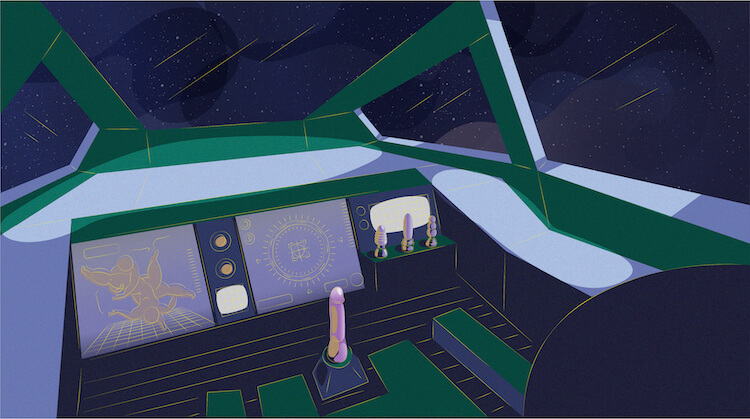Pleasure and Consent in Sex in Space
We should bring the plurality of sex with us into space and prioritize inclusive care.

As part of the ongoing Future of Sex Expert Series, the co-founder of EXO-MOAN studio shares insights on what inclusive sex in space really looks like.
In 2017, the Express Tribune ran an article boldly titled, “Mission to Mars may be all-female to avoid astronauts having sex.”
The article neatly highlights two of the cosmic problems we need to address when we talk about sex in space: It’s almost always procreative (sex is only for having babies don’t you know!) and it’s almost always heterosexual (sex is only between men and women, right?).
We’re well aware that neither of these are really the case here on Earth. People have all kinds of sex for all kinds of reasons. We have solo sex and partnered sex. We have queer sex and we have straight sex. We have sex because we want babies and we have sex for pleasure. We have sex for the natural high after cumming, we have sex because we love the experience in the moment. We have sex with toys, we have sex with other people. Indeed, FutureofSex.net itself is somewhat a pantheon to the different possibilities of sex, the tools we’ve made to support all people to have healthy sex lives, and the systems we have to keep people safe when having sex.
It’s taken us a while to get here—and it’s not been an easy ride to do so. So why do we suddenly stop thinking like this when we think about space?
I believe we should bring this plurality of sex with us into space and make sure we prioritize care, intimacy, and pleasure. Inclusive sex in space is the way forward!
Inclusive sex in space requires acknowledging the potential for harassment
But thinking inclusively about sex doesn’t only mean making room for more ways of thinking about intimacy. It also means thinking carefully about consent, harassment, and the care we give to people.
Sexual harassment in the space industry here on Earth is rife.
Recent allegations swept industry leaders in 2021. At SpaceX, unwanted sexual advances and inappropriate touching was reported by many members of staff of multiple genders, as well as allegations of sexual harassment by Elon Musk himself. Twenty-one former Blue Origin employees wrote a public letter about the sexism of the company, including “physically groping a female subordinate,” sexist denigration, and a culture of sexual harassment.
In 2022, NASA’s Decadal review of the Planetary Science and Astrobiology Field reported that in one study, 64% of all people who had been on fieldwork for space sciences experienced sexual harassment in the field. In a recent terrestrial analogue mission in HI-SEAS Hawai’i, it became clear there were no existing procedures to deal with sexual harassment when one analogue-astronaut joked on twitter that about impregnating his four colleagues.
These are not far future problems. This is already happening to people right now.
RELATED READ: Space Sexology: Researchers Call on Space Programs to Support New Field
Understanding what consent looks like in space while we’re still on Earth
We need to be having discussions about how we as a community want to understand sex and consent when we move to space.
A truly inclusive approach to caring about sex means its not just about pleasure—it’s also about making sure people are not in unknown danger doing it. It’s not just the mechanics of it that matter. If you give consent on Earth, does it mean you have to do it in space? If you are sexually harassed in your habitat on Mars, how do we deal with the harasser?
Pretending that these experiences are not going to happen in space is not good enough. It opens us to having to resolve issues on the fly when they happen, rather than avoiding the worst-case through preparation and having support systems in place.
Queer sex educators already think through lots of similar questions. What does it mean to consent to sex, for example? How can we build inclusive environments to discourage sexual harassment?
We should be drawing in these kinds of communities into thinking about interplanetary futures to make sure that the sex we can have in space is as deliciously varied, safe, liberating, and empowering as it can be here on Earth.
Image sources: Akvilė Terminaitė

















